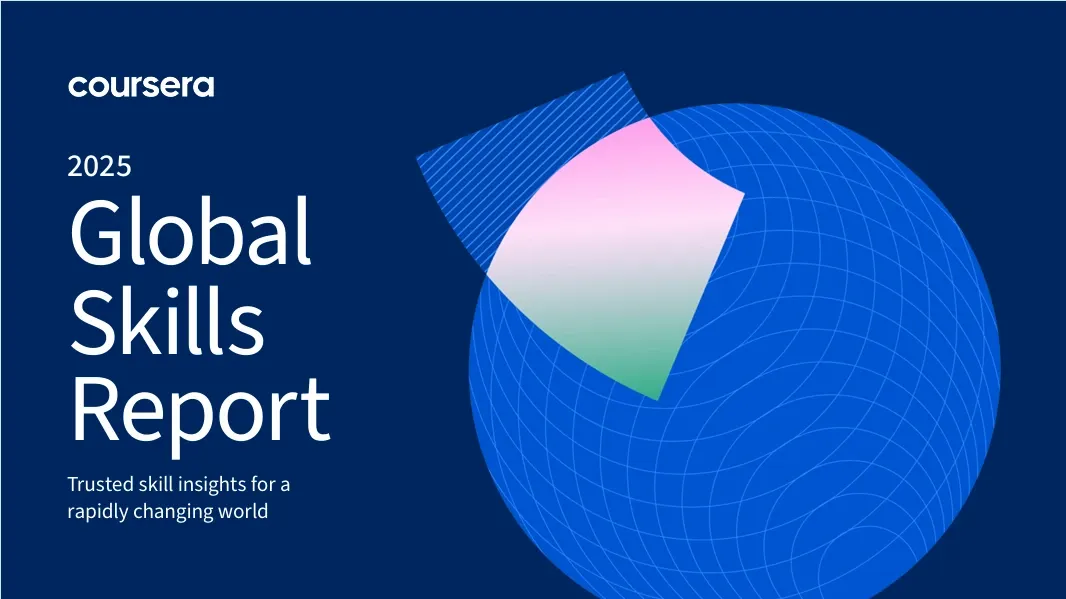Global Skills 2025: How GenAI and Micro-Credentials Are Reshaping the Workforce

1. Introduction
As the global workforce continues to evolve at an unprecedented pace, fueled by rapid technological advancements, shifting economic landscapes, and growing demand for specialized skills is more critical than ever. Coursera’s Global Skills Report 2025, leveraging insights from over 170 million learners worldwide, offers a data-driven lens into how professionals, organizations, and nations are navigating this transformation. Highlighting the explosive growth of Generative AI (GenAI) education and the increasing relevance of micro-credentials, the report provides a strategic overview of the emerging trends reshaping the future of work.

Table of Content
- Introduction
- Key Global Trends in 2025
- GenAI Dominates Learning Demand
- Cybersecurity Needs Are Rising—But Still Behind
- Micro-Credentials: Career-Boosting Signals
- Gender & Geographic Gaps in Skills
- Skills-First Learning & Organizational Transformation
- Conclusion
2. Key Global Trends in 2025
In 2025, the global learning landscape is accelerating toward a digital-first paradigm, with a sharp emphasis on high-demand technological competencies. Notably, enrollments in Generative AI (GenAI) surged by an impressive 195% year-over-year, establishing it as Coursera’s fastest-growing domain.
Reflecting this momentum, Coursera introduced a new AI Maturity Index, benchmarking 109 countries on their capacity to adopt and scale AI innovation—led by frontrunners such as Singapore, Switzerland, and the United States.
At the same time, lifelong learning is no longer optional. According to the World Economic Forum, 59% of the global workforce will require retraining by 2030. In response, micro-credentials and skill-based hiring models are rapidly emerging as effective solutions to close the global skills gap and future-proof talent pipelines.
3. GenAI Dominates Learning Demand
By 2025, Coursera hosts nearly 700 Generative AI (GenAI) courses, collectively averaging 12 enrollments every minute—a clear indicator of soaring global demand. This momentum is being largely driven by employers: 94% report a strong likelihood of hiring candidates with GenAI certifications, while 75% express a preference for GenAI-proficient talent even over those with more traditional experience.
Importantly, this trend is not confined to advanced economies. Latin America experienced a remarkable 425% surge in GenAI enrollments, while emerging markets such as Vietnam (+417%) and Indonesia (+237%) underscore a global shift toward democratized access to AI education. These figures signal a transformative moment in how businesses and nations are reimagining workforce development.
4. Cybersecurity Needs Are Rising—But Still Behind

While cybersecurity enrollments are climbing—106% in Latin America and 14% in Asia Pacific—but the demand still vastly outpaces supply. The world needs nearly five million more cybersecurity professionals. GenAI-driven data vulnerabilities add urgency to this skills gap.
Employers rank Security Management Specialist among the fastest-growing roles, yet less than half feel prepared to handle AI-driven threats. Industry-recognized programs, such as Google’s Foundations of Cybersecurity, are emerging as critical pathways for building robust, future-ready security talent.
5. Micro-Credentials: Career-Boosting Signals
Looking ahead to 2030, the global labor market is projected to undergo significant disruption—with 170 million new roles emerging, even as 92 million existing positions are displaced. In this shifting landscape, micro-credentials are rapidly gaining traction as the new currency of career mobility. Coursera’s data reveals a strong endorsement across stakeholders:
- 91% of employers trust micro-credentials for verifying job-readiness
- 94% of students say they accelerate career progression
- 94% of higher education leaders believe they improve graduate outcomes
North America and the Middle East lead in Professional Certificate enrollments, with growth rates above 35% year-over-year.
6. Gender & Geographic Gaps in Skills
Women now comprise 46% of Coursera’s global learner base, marking significant progress in digital inclusion. However, gender disparity persists in high-demand domains, with women accounting for only about one-third of GenAI course enrollments. Kazakhstan stands out with 56% female participation, while countries like Singapore are actively narrowing the gender gap through targeted national initiatives and the visibility of female role models in tech.
Geographic context also shapes GenAI adoption. While countries such as Vietnam and India are seeing rapid enrollment growth, their relatively lower rankings on Coursera’s AI Maturity Index indicate untapped potential in translating educational momentum into scalable, real-world AI applications.

7. Skills-based Learning & Organizational Transformation
Organizations are increasingly moving away from traditional resume-based hiring in favor of skills-first recruitment models. Today, 97% of companies either have adopted or are exploring this approach, prioritizing verified competencies over academic degrees. Coursera reports that capstone-driven credentials, such as Professional Certificates, are playing a pivotal role in supporting this transition by demonstrating job-readiness through practical outcomes.
This paradigm shift also promotes equity in hiring, helping to reduce bias and build more diverse, inclusive talent pipelines. As over half of global CEOs identify labor and skills shortages as a direct threat to profitability, skills-based systems are emerging as a strategic solution to workforce resilience and long-term growth.
8. Conclusion
The Global Skills Report 2025 delivers a clear message: the future of work is no longer on the horizon—it is already here, demanding agility, inclusivity, and a commitment to lifelong learning. Platforms like Coursera are democratizing access to high-demand skills, empowering individuals across diverse geographies and backgrounds to thrive in fields such as Generative AI, cybersecurity, and data science. In parallel, specialized platforms like Codepresso are advancing the tech learning ecosystem by delivering targeted, job-relevant content in areas including AI, web development, cybersecurity, and automotive mobility.
By embracing micro-credentials, empowering diverse talent, and aligning learning with practical industry needs, businesses and nations can cultivate a resilient, future-ready workforce—and secure a sustainable competitive advantage in today’s rapidly evolving global economy.




Comments ()